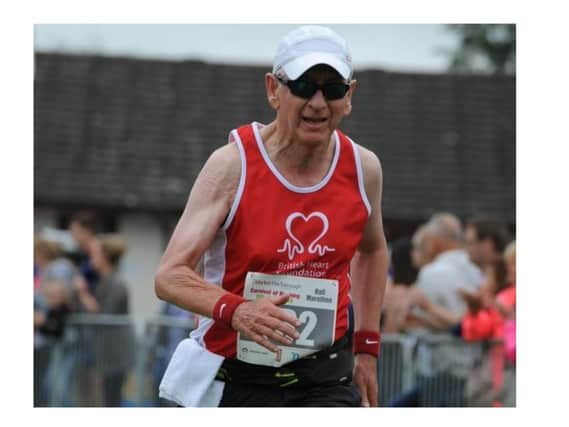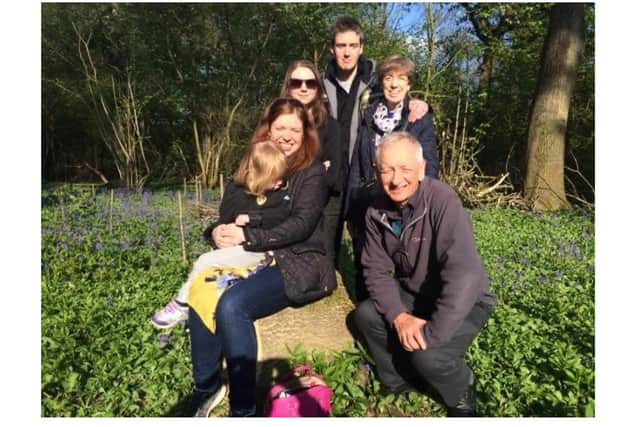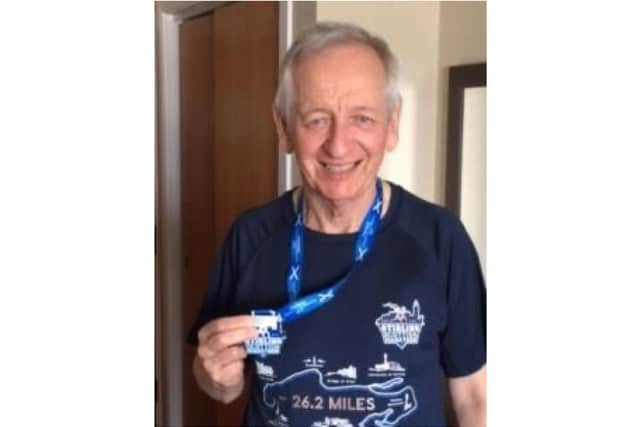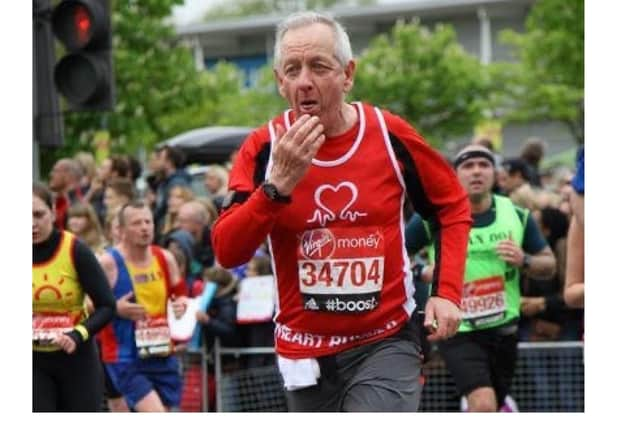Harborough survivor who was brought back to life after cardiac arrests gets ready for his next marathon challenge


A cardiac arrest survivor from Market Harborough who was brought back to life is now getting ready for his next marathon challenge.
Bill Kerr has been living with an ICD, a device which treats abnormal heart rhythms, since suffering multiple collapses in August 2012.
Advertisement
Hide AdAdvertisement
Hide AdBut now he will be lacing up his running shoes for the British Heart Foundation’s (BHF) MyMarathon challenge.


The retired management consultant was delivering a training course in Northampton when he felt unwell.
“It’s a day I will never forget,” said Bill.
“It had just passed 11am so I had called for a break, but I stood up and then suddenly felt dizzy. The next thing I recall was a number of concerned faces looking down at me, before becoming aware of two people pumping at my chest.”
Bill was taken to hospital where he received several tests and a scan of his heart – but, as no issues were detected, medics believed he had suffered a seizure.


Advertisement
Hide AdAdvertisement
Hide AdHe was discharged from hospital, but the following 24 hours saw Bill suffer two further collapses. The father of two, who was aged 61 at the time, was taken to A&E both times and discharged.
Just hours later, Bill was found unconscious in bed by wife, Claire, who used CPR to help revive him. But when an ambulance arrived, Bill collapsed again in front of a paramedic.
Bill, now aged 70, said: “Claire explained to me later that the paramedic had screamed to her colleague that she needed a defibrillator to shock my heart. She explained that this was no seizure, and that I was actually having a cardiac arrest.”
Paramedics rushed Bill to John Radcliffe Hospital in Oxford, where he was taken to intensive care. Whilst there, he suffered two further cardiac arrests.


Advertisement
Hide AdAdvertisement
Hide AdThrough a further detailed scan, a cardiologist discovered that the cardiac arrests had been caused by a fast, abnormal heart rhythm known as ventricular arrhythmia.
It was decided that Bill would benefit from an ICD, which was implanted into his chest. The device sends electrical pulses to regulate abnormal heart rhythms, especially those that could be dangerous and cause a further cardiac arrest.
After 19 days in hospital, Bill was able to return home and began the road to recovery – and top of his agenda was getting back into running. Ten years before his cardiac arrests, the grandfather of one had found a passion for marathon running, which had led to him participating in events in the US and Germany.
In line with advice from his doctors, Bill slowly built up his running distance – so much so that by 2015, he was able to take part in the London Marathon in aid of the BHF.
“The atmosphere was incredible,” added Bill.
Advertisement
Hide AdAdvertisement
Hide Ad“I remember battling through a lot of pain but was determined to finish. I managed to complete in four hours 27 minutes, three and a half years to the day of my cardiac arrests. It felt fantastic, especially having my friends and family there to share that moment with.”
Bill has since completed several other events, such as the Florence Marathon in Italy and the Great North Run, in aid of the BHF. However, since the start of the Covid-19 pandemic, many marathons have been postponed or cancelled.
Now the BHF is calling for people to take on a marathon their way this June with the launch of its MyMarathon challenge. Supporters are encouraged to cover 26.2 miles over the month to raise funds for the charity’s research, which aims to improve the lives of those living with conditions such as heart disease, stroke and vascular dementia.
Bill, who aims to complete the marathon distance in one go, said: “It is a privilege to be running again for the BHF. Without the work that they do I would not be here today – it’s as simple as that.
Advertisement
Hide AdAdvertisement
Hide Ad“Running the 26.2 miles is always a challenge and even after 24 marathons I have learnt never to underestimate the event. I will be training as rigorously as if I were going to pound the streets of London or New York. It will also be great to have the support of other BHF runners in completing the challenge.”
And the challenge isn’t just for marathon runners – anyone can take part, and can even break the distance up into daily chunks.
Charlotte Long-Howell, MyMarathon Marketing Manager at the BHF, said: “We are thrilled that Bill is among our team of MyMarathon champions who will be going the distance in June to help raise funds for the BHF’s life saving research.
“No matter what your level of fitness or running experience, MyMarathon is a fun event that not only helps a vital cause but can also benefit your physical and mental health.
Advertisement
Hide AdAdvertisement
Hide Ad“The devastating impact of the Covid-19 pandemic means that we have had to halve our funding for new research into heart and circulatory diseases. This research is funded by the public, including by those who take part in events like MyMarathon, so their support has simply never been more needed.”
To find out more or to sign up, visit www.bhf.org.uk/mymarathonTo donate to Bill’s JustGiving page, visit www.justgiving.com/william-kerr8